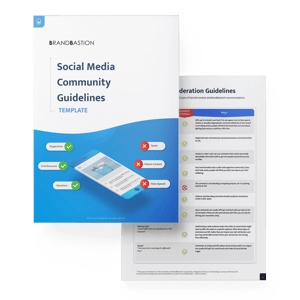
How To Set Up Community Guidelines On Social Media
Update your community guidelines and social media moderation policies
When was the last time you looked over your community guidelines? With “hate speech” and “fake news” being buzzwords of the day, perhaps it’s time to think about how to create community guidelines that resonate with your brand's identity.
Recently, there has been a growing public debate on the responsibility of social networks - and the brands that use them to promote their businesses - to moderate content effectively.
Click here to download free moderation guidelines for your brand!
On the one hand, moderation is needed to filter out hate speech and illegal cyber-attacks (such as trolling and doxxing
In a world where platforms are being held accountable for how content is being moderated, brands operating on social are expected to play their part as well.
The importance of community guidelines
Having inconsistent or “unfair” moderation policies or a failing to respond to offensive comments on a brand’s social properties could negatively impact brand reputation and trust. When such comments are rampant on ads, they affect ad performance and ultimately drive advertising costs up.
Having clearly defined community guidelines and moderation policies
Major brands on social media have already posted up such policies on their websites and Facebook pages. Here are some of their community guidelines examples:
Brands have also come forward on Instagram to emphasize the importance of their community guidelines and the reason they choose to moderate conversations in their online communities.
BBC Sport's moderation policy
BBC Sport shared publicly on several social media accounts that they will:
- Block people bringing hate to their comments sections
- Report the most severe cases to relevant authorities
- Work to make their accounts kind and respectful places
- Keep growing their coverage of women’s sports, and keep covering issues and discussions around equality in sport
-2.png?width=1200&name=BlogHeader_%201200x630%20(3)-2.png)
Coop UK
Co-op UK was among the UK grocers that took a firm stance against racism following racist reactions to a Sainsbury Christmas ad that featured a black family. The retail food business stated on social media that action will be taken against those who leave racist comments on its social media pages. According to the Co-Op UK’s Instagram page, racist comments will be reported, deleted, and blocked in an aim to build an open and safe online social community.-2.png?width=1200&name=BlogHeader_%201200x630%20(4)-2.png)
Template for creating community guidelines
Feel free to download our template, but here are five important things to take into consideration when developing your community guidelines.
1. Outline the purpose of the community in line with brand values
Oreo’s “Rules of the Road” states:
This Oreo Facebook page is a fun, family-friendly community where people can share their passion for Oreo, and where Oreo can interact with those who love the world’s favorite cookie!
Flickr’s community guidelines state:
We're a global community of many types of people,
who all have the right to feel comfortable and who may not think what you think, believe what you believe, or see what you see. So, be polite and respectful in your interactions with other members.
These examples are not too formal or filled with legal jargon, and they are a non-threatening way to get the message across before diving into the kind of comments that the company reserves the right to delete.
2. Be clear about your moderation policy
When you delete or hide comments (and there are certainly some that should be removed, like spam or hate speech), explain clearly the kind of circumstances under which you will do so.
For example, the Business Development Bank of Canada’s Social Media Community Guidelines state that:
In order to create a positive and engaging environment for users among our BDC SM Accounts, we ask all users to treat each other with respect. Users may disagree with an idea; however, they must be respectful of others at all times. Insults, threats or harassment of other users, organizations or employees are prohibited.
BDC will not tolerate and reserves its right to delete - to the full extent that each respective social media platform allows - any post or comment that:
- are defamatory, indecent, hateful, racist, xenophobic, homophobic, sexist, disgraceful, vulgar or inappropriate;
- encourage or suggest illegal activity, announcements from labor or political organizations and unintelligible or irrelevant posts.
In the statement above, the BDC makes is clear that comments that do not adhere to its code of conduct can be deleted, along with spam or scam posts or anything that does not correlate to their business (“unintelligible or irrelevant posts”).
The same applies to
Bank of America reserves the right to ban any user from our page without prior written notice or consent for violations of community policies. Any comment(s) posted which we deem to be criminal in nature, or instigates or implies violence toward oneself or another may be reported to the proper authorities.
3. In addition to stating what is not allowed, explain what is welcomed and encouraged
Playstation’s Comment Policy states:
We want to hear from you and encourage comments, critiques, questions, and suggestions. We ask that you simply stay on topic, respect other people’s opinions, avoid profanity, offensive statements, illegal content, and anything else that might otherwise violate our standard terms and conditions.
This clearly explains that the company does welcome conversations and wants to hear from its fans.
4. Explain if there are any legal restrictions or regulations preventing you from commenting on certain topics
Johnson & Johnson’s Social Media Community Guidelines state:
“Because we are a public company in a regulated industry, there are certain topics we won’t be able or willing to talk about here, and some of your discussions may need to be redirected or curtailed for the same reason.”
The list of topics they describe in further detail in the guidelines includes "off-label" or undirected uses of products, medical advice, and product usage information in addition to the usual illegal topics such as copyright-infringing content and predatory content.
5. Organic properties and ads may require different community guidelines
The type of organic conversations you allow on your public accounts is one thing. The type of conversations you allow on your paid ads is another. If you’re using unpublished posts in your advertising efforts, these posts are only seen by the prospects that you are targeting.
When you set up these unpublished posts as ads, you are spending significant amounts of money on getting them out to the right target audience. While angry feedback may contain valuable learning opportunities, they can be addressed in private through a direct message to the customer. It may be better to hide such outbursts on an ad reaching hundreds of thousands of people and deal with them privately to protect your ad spend from being used to promote a negative perspective.
Moderation Made Easy With BrandBastionBonus: Download free “Social Media Community Guidelines Template”
|
